Tuesday, March 25, 2025. Annette’s Roundup for Democracy.
Have you emailed the President of Columbia? Or of your college?
I did.
Jonathan Cole, the former provost of Columbia, makes it clear why we should all join the battle, to save our universities, and to save the future.
Also, consider contacting your elected officials about this, including the man now in the White House.
As David French wrote in the Times earlier in the month,
Columbia isn’t a public university, so it is not bound by the First Amendment (which only protects against government censorship), but I’m persuaded by the moral force of the Supreme Court’s words in a 1957 case called Sweezy v. New Hampshire: “Teachers and students must always remain free to inquire, to study and to evaluate, to gain new maturity and understanding; otherwise, our civilization will stagnate and die.”
Columbia’s Capitulation Will Hurt Us All
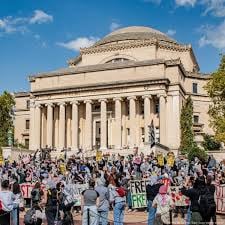
When most Americans think about our great universities, they probably don’t think about the origins of lasers, FM radio or bar codes; they don’t think about the Google algorithm, the invention of the computer and the iPhone, cures for childhood leukemia, the Pap smear, scientific agriculture or the discovery of mRNA vaccines. They almost certainly don’t think about the CRISPR technology that may lead to cures of many genetic-based diseases. And they definitely don’t think about the electric toothbrush, Gatorade, the Heimlich maneuver or Viagra.
Yet all these discoveries and inventions — and tens of thousands more — have their origins at American public and private research universities. For over a half century, these institutions have housed the best and most innovative sites of learning in the world. During World War II, university researchers, often at government-sponsored laboratories, developed enhanced radar technology, found a way to mass-produce penicillin, developed the jet engine and mastered techniques for blood plasma transfusions. Each of these discoveries helped the Allies defeat authoritarian aggression.
Today, the pre-eminence of the American research university is under severe attack from the federal government. It must be defended.
Again and again, basic research has led to fantastically lucrative private development. Stanford graduates spawned Cisco Systems, Hewlett-Packard, Instagram, Netflix and a thousand more businesses. The University of California, Berkeley, produced companies, including many A.I. startups, that are developing better medical treatment for Americans. M.I.T., Harvard, Arizona State, the University of Wisconsin and the University of Texas, among others, have become the origin for many private enterprises supporting the American economy.
The Trump administration has sought to impose its will on higher education by withdrawing more than a billion dollars of funding from some universities and threatening others with similar punishment. It has sought to deport student protesters who are legal residents. All this represents a fundamental assault on the values and functioning of our university system. Columbia and Johns Hopkins, founded in 1876 and America’s first true research university, may be only the first to feel the effects of this needless use of a sledgehammer.
Columbia’s capitulation last week to the Trump administration, in which it agreed to a number of demands in order to restore federal funding, obliterates its leadership in defending free inquiry. If Columbia allows authoritarian-minded leaders to dictate what we can teach, then the federal government will dictate what we can read, what books we may have in our libraries, what art we can display, what problems scientists can explore. Then, we are no longer a free university.
Most people think of universities in terms of undergraduate and professional education — of teaching and the transmission of knowledge, as well as football and basketball. This makes perfect sense. Teaching is higher education’s first calling, and it occurs at all levels at pre-eminent universities.
What has made our universities the greatest in the world, however, is not just the quality of our undergraduate education, but our ability to fulfill one of the central quests of modern life: the production of new knowledge through discoveries that change the world. The Nobel economist Robert Solow and others have estimated that such university-based discoveries are responsible for a large share of our nation’s productivity growth.
It is the United States — not Europe, Russia or China — that has dominated the last several waves of fundamental discovery, findings that have made us the wealthiest nation in the world. Since their inception, about 40 percent of Nobel Prizes have gone to Americans. And about 35 percent of all American Nobel laureates have been immigrants to the United States. This is but one small indicator of American research accomplishments. This leadership has strengthened our democracy.
The agreement between the federal government and our universities took hold during World War II. In 1944, when it became clear that the Allies would prevail, President Franklin Roosevelt asked his closest science adviser, Vannevar Bush, how the United States could advance its science and technology leadership after the war. It was a time when scientists were exhausted by their wartime work and many wanted to return to quieter lives at universities. But Bush, sharing the dying president’s belief in the need for a manifesto that would articulate both values and policy, set to work on what would become the policy document “Science: The Endless Frontier.”
As developed by Bush, the compact between the American government and the universities created the National Science Foundation and reorganized the National Institutes of Health. The central message of the compact was this: The United States would commit taxpayer dollars to fund research primarily through its universities, not through government-controlled laboratories. The universities would be given intellectual autonomy to conduct research deemed by peer scientists and engineers to be of the highest potential to advance the country. The government would not invade the space of free inquiry and academic freedom, because that would limit the ability of scientists to be fully creative.
By 1950, the model was largely adopted by Congress. Thus began American supremacy in scientific and technological discovery, as well as the economic and military dominance that has lasted for three-quarters of a century.
Recently, Arizona State University’s president, Michael Crow, one of the most innovative leaders in American higher education today, used the iPhone 16 as an example of universities’ unheralded contributions. Almost every part of the device, from the chips used to power it to the glass covering it — the culmination of thousands of discoveries — had their origins at research universities, mostly in the United States. Such contributions represent the invisible hand behind the creation of much American wealth. Now the Trump administration, for vindictive reasons, has placed that superiority and leadership under threat.
If we look over our shoulder, we can see China catching up to our investments in research and development. In the past quarter century, investments by China in higher education have become similar to those in the United States, and it has increased the building of new research-oriented universities to compete with us in STEM fields.
This is hardly the time to cripple our own universities. Apart from the competition with China, we are on the cusp of thousands of transformative discoveries, and each could be hurt by Mr. Trump’s actions. Here are a few competitive battles that we could easily lose: America as leader in the development of quantum computing; America as leader in the development of useful artificial intelligence and hydrogen and fusion power; America as leader in discovering cures for various forms of cancer and Parkinson’s and Alzheimer’s disease.
Maintaining a laboratory and preparing for discovery is not something you can easily turn on or off. If a lab has its funding suddenly taken away, it will shut down. If you cut off researchers working on a cure for, say, pancreatic cancer, the work that their lab has done may be irreparably damaged and the knowledge lost. Moreover, if young people in the United States or abroad feel great uncertainty in university research here, they are more than likely to turn to other occupations and away from this country.
We tend to think that humans are at the top of the food chain. That is not true. We almost certainly share that position with bacteria and viruses, many of which can cause us great harm. To prevent the next pandemic and a host of other diseases, support of science and engineering at our universities is an imperative.
We should renew and update the terms of the 1945 compact to reinforce the basic principles and values that have served us so well for decades, and could for decades more to come. Academic freedom and free inquiry are the backbone of that compact. Where there are opportunities for reform, it is incumbent for research universities to take on those tasks themselves, without political interference.
I have spent almost 65 years at Columbia. I entered as an undergraduate in 1960, received my doctorate there, and never left. Yes, universities are contentious places, but they are supposed to be places where criticism takes place — whether political, humanistic or scientific disputes. When I became provost and dean of faculties, serving 14 years as Columbia’s chief academic officer, I dealt, alongside my colleagues, with student protests almost every year. When the federal government threatened Columbia with arrests or withdrawal of federal funds after the passage of the USA Patriot Act in 2001, we defended academic freedom and free inquiry.
Today, the stakes are higher. We are in a fight for survival and appeasement never works. Despite platitudes to the contrary, Columbia’s leaders have weakened our community and our leadership among the greatest educational institutions in the world. This is not the way to fight Mr. Trump’s efforts at silencing our great American universities. If we don’t resist collectively by all legal means, and by social influence and legislative pressure, we are apt to see the destruction of our most revered institutions and the enormous benefits they accrue to America.(New York Times)
More proof of why Appeasement of Bullies never works.
The Law Firms.
The Elite Institutions Caving to Trump
President Trump issued an executive order on Friday with few apparent analogues in White House history.
The order rescinded a directive Trump had signed just one week earlier — already unusual by itself — directing government officials to target the white-shoe law firm Paul Weiss, by revoking security clearances held by the firm’s lawyers, limiting their access to government buildings, reviewing government contracts with the firm, and even, “to the extent permitted by law,” urging agencies to refrain from hiring the firm’s employees.
Three reasons were given for the initial order. One was the firm’s emphasis on diversity in hiring, although Trump’s own order acknowledged that that hardly made the firm unique: “nearly every other large, influential, or industry leading law firm” shares that emphasis, the president wrote. The two other reasons are what set the firm apart: its involvement in a pro bono lawsuit against the Proud Boys and the Oath Keepers for their role in the January 6th attack, and its hiring of Mark Pomerantz, a prosecutor who worked on the New York criminal investigation of Trump that ultimately led to his first indictment.
It was an extraordinary move by the federal government to target a law firm because it had hired people and brought lawsuits the government disagreed with. But what came next was equally extraordinary: the president personally entered into an agreement with the firm, a private company, to shape its business practices.
In his Friday follow-up order, Trump announced that Paul Weiss had “indicated that it will engage in a remarkable change of course.” His initial order would be undone as a result.
The details of the deal between Paul Weiss and the Trump administration are a bit shaky, because there are three relevant sources: a Truth Social post by Trump, announcing the firm’s “agreement with the president”; the Friday executive order formalizing the deal; and an internal email from Paul Weiss chairman Brad Karp. All three describe the agreement differently.
The executive order and Truth Social post announce that Paul Weiss has agreed to take on pro bono lawsuits and hire lawyers representing a wider spectrum of political beliefs. Karp said only that the firm had “reiterated our commitment to viewpoint diversity.”
The executive order says that Paul Weiss has committed to practicing “merit-based hiring, promotion, and retention, instead of ‘diversity, equity, and inclusion’ policies.” The Truth Social post goes even farther, announcing that a team of experts — “mutually agreed upon” (with the White House? With Trump himself? It wasn’t clear) — would “conduct a comprehensive audit of all of its employment practices.”
Karp’s email mentions no such audit, and does not include a commitment to end DEI policies. “While retaining our longstanding commitment to diversity in all of its forms, we agreed that we would follow the law with respect to our employment practices,” the chairman wrote.
The executive order says that Paul Weiss would dedicate “the equivalent of $40 million in pro bono legal services during my term in office to support causes including assisting our Nation’s veterans, fairness in the justice system, and combating anti-Semitism; and other similar initiatives.” Once again, the Truth Social post signals even more government involvement: “combatting anti-Semitism” becomes assisting the President’s Task Force to Combat Antisemitism; “other similar initiatives” becomes “other mutually agreed projects.”
And, once again, Karp’s email makes the move sound like more of the status quo: “We agreed to commit $10 million per year over the next four years in pro bono time in three areas in which we are already doing significant work: assisting our Nation’s veterans, countering anti-Semitism, and promoting the fairness of the justice system.” He added, “to clarify misinformation perpetuated from various media sources” (although one such source appeared to be the president), that “the Administration is not dictating what matters we take on, approving our matters, or anything like that.”
Finally, the Truth Social post also says that Karp “acknowledged the wrongdoing of former Paul Weiss partner, Mark Pomerantz, the grave dangers of Weaponization, and the vital need to restore our System of Justice.” Neither the executive order nor Karp’s email mention anything about Karp condemning Pomerantz.
As I wrote on Friday, details matter: President Trump often tries to exaggerate his own accomplishments, which is why it’s important to look at the fine print to see how much has actually changed (or, in this case, to compare the fine prints against each other). But there is also a broader truth at play here: Even by Paul Weiss’ own admission — no matter the precise concessions — Trump was able to exact a pound of flesh from a private adversary by threatening a governmental crackdown.
“The executive order could easily have destroyed our firm. It brought the full weight of the government down on our firm, our people, and our clients,” Karp wrote in his email, which was obtained by the Original Jurisdiction newsletter. Paul Weiss initially planned to challenge the order, as law firm Perkins Coie is doing with a similar Trump directive, Karp added, but in the end: “We did exactly what we advise our clients to do in ‘bet the company’ litigation every day,” he said. “We talked with the Administration to see if we could achieve a lasting settlement that would not require us to compromise our core values and fundamental principles.”
Paul Weiss is not the only elite institution making this calculation. Hours after Trump issued his follow-up executive order Friday, Columbia University announced a flurry of policy changes, including a ban on students wearing face masks at protests, changes to the school’s disciplinary process, and a new official overseeing its department of Middle East, South Asian and African Studies.
These changes matched almost exactly a list of demands the Trump administration had sent Columbia in a letter the week before, as part of an ongoing dispute over $400 million in federal funding that the administration had revoked from Columbia. According to the letter, fulfillment of the demands would not be enough to restore the funding; rather, it would be considered a “precondition for formal negotiations regarding Columbia University’s continued financial relationship with the United States.”
The recent changes by Paul Weiss and Columbia University follow other moves since Trump’s second election by private companies and foreign governments alike to adapt — or submit — to Trump’s transactional approach. Jeff Bezos, another first-term Trump antagonist, has transformed the opinion section at his Washington Post newspaper, while his company Amazon has agreed to pay $40 million to license a documentary on Melania Trump. (Much of the sum will go the first lady directly). ABC News agreed to give $15 million to Trump’s presidential library to settle a defamation lawsuit. A recent White House statement noted four times that Ukrainian president Volodymyr Zelensky thanked the president during a joint phone call.
These decisions are all the more striking because they mark such a separation from the “resistance” posed to Trump by many academic and corporate institutions in his first term. Yes, Trump is more popular than he was last time — but only barely. According to the Silver Bulletin newsletter, Trump’s approval rating stood at 43.4% approve/50.9% disapprove at this point in his first term. It stands at 47.5% approve/49.7% disapprove today.
But a cultural shift towards Trump — although perceptible in other respects — isn’t necessary to explain why American institutions have responded to him so differently this time around.
Instead, much of the difference can be explained by the difference in Trump’s own actions: his willingness to push the envelope farther than he did in his first term — to revoke funding, or security clearances, or military aid, until he secures satisfactory concessions.
And with each previously antagonistic institution that has folded, Trump has only grown more emboldened: his administration is now threatening funding to other universities, hoping for more Columbia-style changes. He also signed a memo Friday directing officials to expand his campaign against law firms. “Well, the law firms all want to make deals,” he told reporters that day.
Oftentimes, as in Ukraine, Trump demands a “thank you” from negotiating partners. Other times, “I’m sorry” is what he’s looking for: the president demanded on Saturday that Maine Gov. Janet Mills (D) offer a “full throated apology” for their confrontation last month at the White House.
Applying the model he has pursued with private actors like Columbia and Paul Weiss to the public sector — in fact, to one of the states he leads — Trump signaled that a series of investigations his administration has launched into Maine’s state government would not be lifted until Mills offered her apology. (Gabe Fleisher, Wake up to Politics).
Cowardice and Capitulation Stain the Legacy of Once Esteemed Mega Law Firm.
Where Will It Stop?
The Trump administration seized on the capitulation by the Paul Weiss law firm to expand and intensify its attack on the legal profession late Friday. The Trump White House issued a new presidential memoranda – inartfully and misleadingly titled “Preventing Abuses of the Legal System and the Federal Court” – that directed Attorney General Pam Bondi to go after lawyers and law firms that challenge the administration in court.
The escalation of the attacks on lawyers is happening in parallel with Trump’s attacks on individual federal judges and more broadly on the judicial branch’s constitutional powers.
As the White House celebrated its successfully bullying of Paul Weiss and as some of the nation’s leading law firms meekly scrambled to avoid being Trump’s next target, the president upped the ante by demanding that his attorney general seek sanctions and disciplinary actions against lawyers opposing the administration who violate the law or ethical standards. But the real thrust of the memo was to give Trump a mechanism for continuing to undermine, weaken, and intimidate the legal profession.
As The Guardian noted, Trump directed Bondi in the memo to report directly to him any lawyers litigating against the government “who engage in frivolous, unreasonable, and vexatious litigation against the United States or in matters before executive departments and agencies of the United States,” an arguably loser standard than the one imposed by the cannons of legal ethics:
The memo, as a result, created a formal mechanism for Trump to unilaterally decide whether to impose politically charged sanctions through executive orders that strip lawyers of the security clearances they need to perform their jobs or prevent them from working on federal contracts.
In another clear sign that Trump is looking for payback against lawyers and law firms, he ordered Bondi to review cases against the federal government all the way back to the beginning of his first term to punish anyone “filing frivolous litigation or engaging in fraudulent practices.”
The implication of the Trump memo is that other lawyers and law firms will find themselves in the crosshairs of a retaliatory executive order targeting them the same way he has singled out Covington & Burling, Perkins Coie, and Paul Weiss. (Talking Points Memo)
One more thing.
David Kurtz, Executive Editor of Talking Points Memo, weighed in a Columbia’s appeasement as well:
It’s NEVER Enough
In a desperate attempt to restore $400 million in federal funding that President Trump is lawlessly withholding, Columbia University agreed to make a number of invasive concessions to how the university is run – and now those concessions that are already being deemed insufficient by a Trump DOJ official.
“I will tell you right now that Columbia has not in my opinion — and the opinion of the Department of Justice — has not cleaned up their act,” said Leo Terrell, a senior Trump DOJ lawyer. “They’re not even close, not even close to having those funds unfrozen.”
Cowardice and Capitulation Stain the Legacy of Once-Esteemed Mega Law Firm.
Paul, Weiss joins the list of institutions and individuals with ample resources to defend themselves, who nevertheless have refused to stand up for justice in the face of MAGA intimidation.
“Abject cowardice.”
“[T]he most disgraceful action by a major law firm in my lifetime.”
“[A] stain on the firm, every one of its partners, and the entire legal profession.”
“Unbelievably shameful”
Those were just a few choice reactions to the decision from the Paul, Weiss law firm to capitulate to the Trump regime’s bullying. In exchange for revocation of an inappropriate, unconstitutional, shameful executive decree that sought to bar Paul Weiss lawyers from doing business with the federal government or even appearing inside federal buildings, Paul Weiss agreed to unprecedented infringement on its operations, choice of clients, and hiring practices.
Faced with this assault on the 1st, 5th, and 6th Amendments, Paul Weiss chose not to litigate as another targeted law firm, Perkins & Coie had, but to submit itself to the micromanagement of the federal government, a move so craven and fraught with conflict that every client, associate, partner, and employee will need to reevaluate its relationship with the mega-firm.
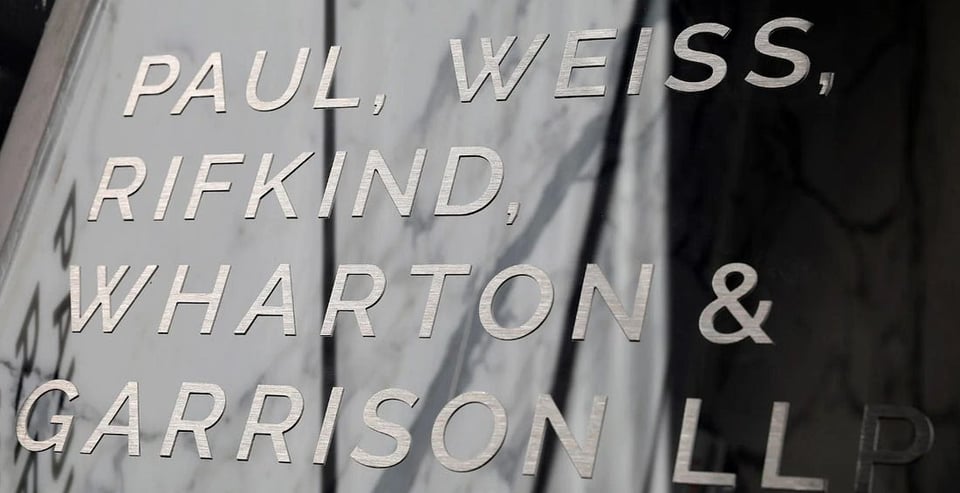
“[T]he firm agreed to represent clients no matter their political affiliation and do $40 million worth of pro bono work on causes that the Trump administration supports, such as fighting antisemitism,” the New York Times reported. How taking clients specifically agreeable to Trump complies with insistence on not taking cases based on their political affiliation is as inexplicable and nonsensical as agreeing to an “expert” monitor approved by the administration to review its hiring practices.
The firm’s internal memo explaining the deal was silent on the specific topic of “DEI,” whereas the Trump version stated the firm agreed it “will not adopt, use, or pursue any DEI policies.” In a statement attempting to rationalize the firm’s decision, Chairman Brad Karp insisted that “the Administration is not dictating what matters we take on, approving our matters, or anything like that.” But the plain language of the “agreement” says otherwise. (His statement that other firms had not rallied to the firm’s defense is belied by Perkins’s decision to litigate and Paul Weiss’s unquestionable ability to obtain counsel from a respected firm…had it chosen to fight.)
The firm’s version made no mention of former partner Mark Pomerantz, who had worked in Manhattan District Attorney Alvin Bragg’s office and publicly admonished Bragg for not filing charges against Trump. (Of course, Bragg later filed charges and obtained a 34-count conviction of the now-president.) The version of the agreement released by the White House states, “[Managing partner Brad] Karp acknowledged the wrongdoing of former Paul, Weiss partner, Mark Pomerantz.”
Let us count the ways in which this violates professional ethics, common sense, and basic decency.
Paul Weiss has not explained the discrepancies between the versions of the agreement. Did it actually reach a complete agreement with the government? Is Paul Weiss trying to distance itself from the most intrusive and objectionable aspects of the deal? If it does not repudiate the White House version, many will assume it tried to sugarcoat the deal to clamp down on criticism. Piling one betrayal on top of another only deepens its ethical quagmire.
Every client expects robust representation free from conflicts of interest and ulterior motives. What client could truly expect to receive that from a firm that crumbles in the face of the ire of one vindictive president and his lawless flunkies?
The firm has now become complicit in the bullying and intimidation of other firms and their clients, making it less likely that firms will stand their ground. (As Above the Law reported, the Trump bullies already “sicced the EEOC on 20 additional Biglaw firms over their DEI policies,” a baseless attempt to deter hiring of diverse talent. There is no evidence any of these firms have violated any employment law, nor are they obligated to turn over a slew of confidential records regarding their employees, prospective employees, and internal personnel matters to the Trump snoops.)
Paul Weiss has only fueled the Trump stormtroopers appetite for more conquest. The White House released a new “memorandum” ordering the attorney general to seek federal court sanctions against opposing counsel and to recommend other punishments (e.g. loss of security clearances) for what the Trump crew deems “unscrupulous” conduct. (Considering this “Justice” Department’s frivolous arguments in litigation and flouting of judicial authority, this is rich.)
Paul Weiss may well set off an exodus of lawyers and scare away law students from considering working there. Reuters reports, “Paul Weiss may be dealt a setback in recruiting young lawyers because of its apparent retreat from diversity commitments that have spread through law firms in recent years, and are now under attack from Trump.”
Its reputation as a progressive firm and support for the Democratic Party is permanently sullied. The right to determine its clientele and to advance causes of its own choosing are core 1st Amendment activities that virtually all firms guard fervently.
In an effort to protect its multi-million-dollar practice, Paul Weiss may wind up accelerating its decline. Its lawyers, clients, prospective employees, and law school deans can exact a price by condemning this move, disassociating themselves from the firm and thereby sending a signal to other firms not to follow Paul Weiss’s example. Given a choice between joining a firm of quislings or a firm such as Perkins & Coie or Williams & Connelly, which exemplify the highest ideals of the profession, what top law recruit would join the former?
The decision to cave is peculiar in the extreme. The Wall Street Journal reported:
“Over deliberations last weekend, Paul Weiss partners laid the groundwork to sue the administration, people familiar with the matter said. And the prospects for success were high: Perkins Coie already sued and quickly won a restraining order from a judge, who said the White House moves were likely unconstitutional.”
So even after finding “a partner at litigation powerhouse Quinn Emanuel,” Paul Weiss decided to surrender, running to the White House to negotiate away its independence.
Apparently, Robert Kraft (a Paul Weiss client) “helped set up the meeting, which included Trump, White House chief of staff Susie Wiles, Trump adviser Steve Witkoff, and Boris Epshteyn, Trump’s outside legal counsel.” In other words, this was not the sole handiwork of a single partner.
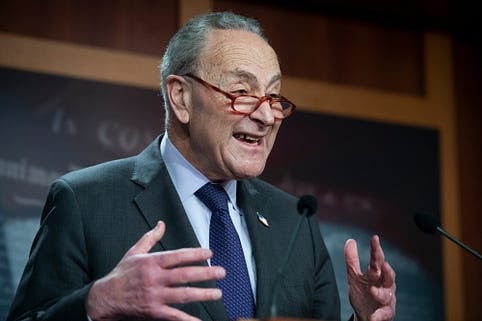
And that raises another troubling, surprisingly under-reported issue. Senate Minority Leader Charles E. Schumer’s brother, Robert, who has sat on the senator’s advisory committee for judicial nominations, is a long-time Paul Weiss corporate law partner. I reached out to Senator Schumer’s office with several questions:
Has he at any point discussed with President Trump or a Trump official the executive order concerning Paul Weiss? The resolution of the EO that the White House reached with Paul Weiss?
Has Senator Schumer discussed the EO or the resolution of the EO with his brother, who is a Paul Weiss partner? Has he advised his brother to resign (or not) from the firm?
What steps, if any, has Senator Schumer taken to eliminate any conflicts of interest either on regulatory or legislative matters with Paul Weiss over the years?
I received no response after repeated efforts to obtain comment. (Just a few days earlier, in an effort to defend his decision to support the MAGA continuing resolution, Senator Schumer trumpeted his condemnation of Trump on Meet the Press: “[D]emocracy is at risk. Look, Donald Trump is a lawless, angry man. He thinks he should be king. He thinks he should do whatever he wants, regardless of the law…. Now we have to fight that back in every single way.”)
Senator Schumer is not responsible for his adult brother’s career decisions. But, as a U.S. senator, he has a duty to disclose whether he had any role whatsoever in this shameful surrender of the legal profession. At the very least, the Democrats’ Senate minority leader should explain his views on the matter, whether he thinks it is appropriate for the Trump regime to go about such shocking bullying, and if not, what he intends to do about it.
Paul Weiss’s capitulation is one more example contributing to a deeply alarming pattern of cowardice from corporate media, universities, Republican toadies, and some misguided Democrats. Too many people and institutions with ample power and resources to defend themselves nevertheless have refused to stand up to MAGA intimidation. Instead, they have betrayed fundamental values that are the cornerstone of our democracy.
The debate rages as to whether we are in a constitutional crisis. The more troubling question remains: Why are so many people afraid to defend the Constitution? (Jennifer Rubin, The Contrarian).
Do you think Elon Musk stole the election for Trump?
Rosie O’Donnell isn’t alone in her opinion.
Watch her compelling argument on Ireland’s late night television. 👇
One more thing.
Rosie O’Donnell wrote apology letter to Irish PM after his Trump meeting
Comedian Rosie O’Donnell revealed she wrote an apology letter to Irish Prime Minister Micheal Martin after her name came up during his meeting with President Trump in the White House.
O’Donnell, 63, moved to Ireland after Trump was reelected as president. The two have famously feuded for years.
During Martin’s trip to the White House on March 12, he received a question about O’Donnell from Georgia GOP Rep. Marjorie Taylor Greene’s boyfriend, Brian Glenn.
“Ireland is known for a very happy, fun-loving people,” Glenn said. “Why in the world would you let Rosie O’Donnell move to Ireland? I think she is going to lower your happiness levels!”
The Irish leader, known as the taoiseach, largely ignored the question, but it apparently bothered O’Donnell.
“I felt very troubled that they put the taoiseach in that position and didn’t treat him with the respect that a leader of that kind deserves when they’re visiting the White House,” O’Donnell said Friday night on an Irish TV show, “The Late Late Show” with Patrick Kielty.
Trump has been ripping O’Donnell for decades. Even back in 2007, he made a crack about her weight while selling chairs.
“Someone asked me how Rosie O’Donnell would like these chairs. They’re not strong enough,” Trump said. “We’d have to have made them stronger.”
During a 2016 presidential debate, when moderator Megyn Kelly pointed out that Trump had called women “pigs, dogs, slobs,” he interjected to say, “Only Rosie O’Donnell.” (Daily News)
On Sunday, Joe and Jill Biden, looking glamorous and debonair, came to the Opening of Othello on Broadway.
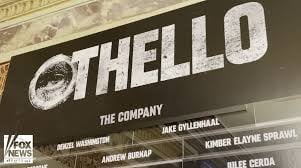
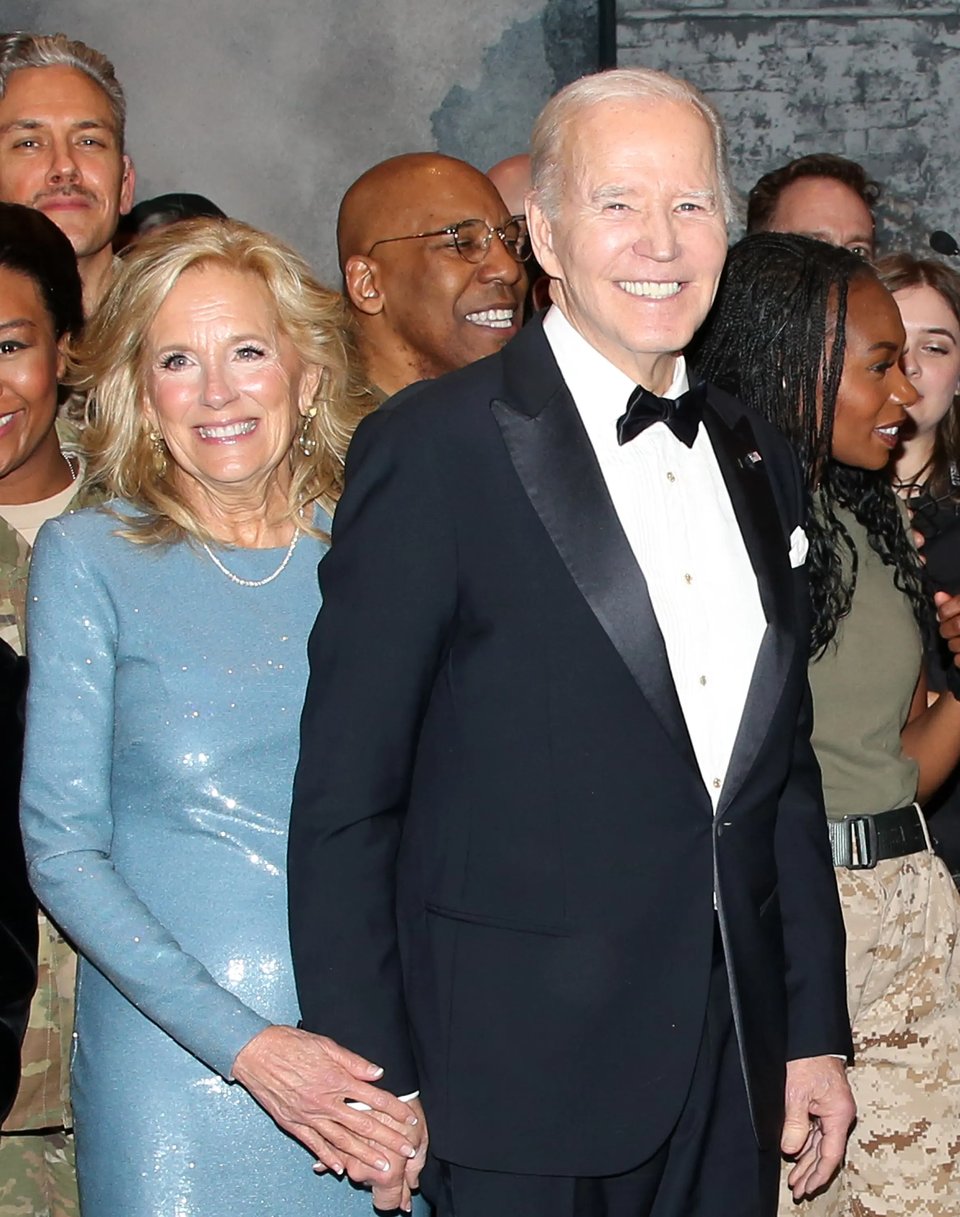
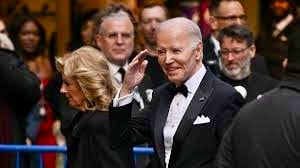
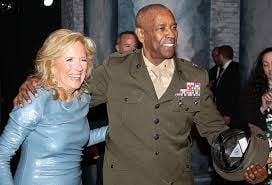
Jill with Denzel Washington.
Looking good, don’t you think?
Want to know what is happening in Wisconsin?
Rallying Anti-Musk Donors, Liberal Judge Raises $24 Million in Key Court Contest
With Elon Musk backing her conservative opponent, a Wisconsin judge seeking a seat on the state’s top court has amassed what is believed to be a record war chest for a judicial campaign.
Judge Susan Crawford, the liberal candidate for the Wisconsin Supreme Court, has raised $24 million for the April 1 election, a record for an American judicial candidate, her campaign said on Monday.
Her war chest — including $17 million raised in the period from Feb. 4 to March 17 alone — approaches that ordinarily expected of a candidate for governor and surpasses those of other recent candidates for statewide office in Wisconsin.
But it is likely to be just a fraction of the total spent on Judge Crawford’s behalf in the contest, which will be the nation’s first major test of both parties’ enthusiasm since President Trump took office and will determine which party holds a majority on the state’s top court.
Most of the money in the race will be spent by super PACs or funneled through Wisconsin’s political parties. State law permits the parties to raise unlimited sums, which they can then transfer to endorsed candidates in unlimited amounts.
Candidates for the court, however, face limits of $20,000 per individual donor. Judge Crawford’s campaign said it had received contributions from 113,000 donors since she entered the race over the summer.
Judge Crawford faces Brad Schimel, a conservative judge who received Mr. Trump’s endorsement on Friday night and who is being aided by millions of dollars of spending from super PACs affiliated with Elon Musk, the billionaire who is leading the president’s effort to cut costs across the federal government.
The Supreme Court race has already drawn $80 million in total spending as of Friday, according to WisPolitics, a political news outlet in the state. With just over a week to go, it is by far the most expensive judicial race in American history, topping the $55 million spent on the state’s last Supreme Court election, in 2023.
The record sums come in part because of the enormous stakes. Liberals now hold a 4-to-3 majority on the court, which in upcoming years is likely to rule on a host of issues such as abortion rights and the state’s election procedures, including congressional redistricting.
A liberal justice, Ann Walsh Bradley, is not seeking re-election. The winner will earn a 10-year term on the court.
Judge Crawford’s fund-raising total is approaching the amount spent by the state’s last Republican nominee for governor, Tim Michels, whose campaign spent $28.5 million during his 2022 loss to Gov. Tony Evers, a Democrat. Mr. Michels, a construction magnate, spent more than $8 million of his own funds on that race, meaning Judge Crawford has now raised more herself than any nonfederal candidate in the state’s history except for Mr. Evers.
The Democratic Party of Wisconsin, which has endorsed Judge Crawford, has not yet released its fund-raising totals for the latest reporting period. It is required to do so later in the day on Monday. Judge Schimel and the Republican Party of Wisconsin have also yet to reveal their fund-raising numbers from the latest reporting period.
America PAC, a super PAC funded by Mr. Musk, has spent more than $6.6 million to back Judge Schimel. Another super PAC affiliated with Mr. Musk has spent nearly as much on television ads in the race.
Judge Schimel participated in a livestreamed chat with Mr. Musk on Mr. Musk’s social media platform on Saturday afternoon.
In a statement, Judge Crawford accused Mr. Musk of “trying to buy influence over the Wisconsin judiciary by getting Brad Schimel elected to the Supreme Court.” She also expressed gratitude for what she called a “historic outpouring of grass-roots support across Wisconsin.”
Judge Schimel told a crowd in Western Wisconsin on Saturday that he had spoken with Mr. Trump and that “he’s going to weigh in and help on this race,” according to a report from The Leader-Telegram of Eau Claire.
During their livestreamed discussion on Saturday, Mr. Musk said that Judge Schimel was trailing in the race. “If you look at the early voting data so far,” he said, “Democrats are winning, which is not good.” (New York Times).
How do you like this news!
We Anti-Trump and Anti-Musk Donors are making a difference.
The Election ends on April 1.
Let’s bring Susan Crawford home to the Wisconsin Supreme Court!
Give her the last funds she needs to win this.